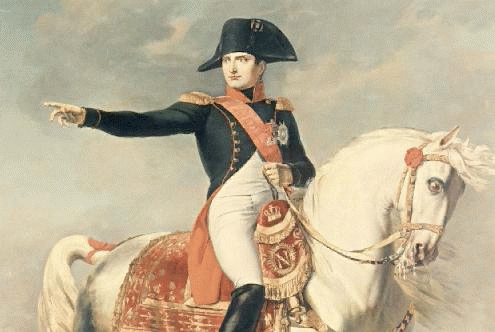 |
 |
 |
 |

At the age of ten, Napoleon left his native Corsica for a military school in Brienne, France, where his academic success was minimal. After a year at the Military Academy in Paris, he was commissioned second lieutenant in the artillery in 1785. He watched the fall of the Bastille in 1789 with approval but from a distance, and spent much of his time over the next few years in Corsica. where he angered the Corsican nationalist Paoli, and his family fled to Marseille in 1793.
In that year he commanded a successful attack on British and royalist troops, and was promoted to brigadier general. He was given the command of the French army in Italy in 1794. He was briefly imprisoned in that year for his involvement with the then-fallen Robespierre, and was soon removed from the list of officers for failure to follow orders. But beginning in October 1795 -- 13 Vendemiaire -- Napoleon successfully quelled a revolt against the revolutionary government. The new government, the Directory, promoted him to commander of the Army of the Interior in 1796.
Napoleon then initiated a series of campaigns against the Austrians and Sardinians in Italy, winning in rapid succession Savoy, Nice, Lombardy, and Mantua for France. In 1797 he crossed the Alps into Vienna and negotiated the Treaty of Campo Formio, ending the first phase of the Revolution. In 1798 he commanded 35,000 troops in Egypt to threaten English interests in India, seizing Malta along the way. He occupied Cairo and Alexandria, founding various institutions devoted to the study of ancient Egypt, leading eventually to the Description d'Egypte (18 volumes, 1808-1825). But while there, Napoleon's fleet was attacked by Horatio Nelson. He returned to France in 1799.
Napoleon worked with Emmanuel Sieyes to overthrow the Directory, succeeding on 9 November 1799 -- 18 Brumaire, by the Revolutionary calendar. He became commander of the Paris garrison and first consul of the new government, the Consulate. The powerful position allowed him to centralize and consolidate government and codify the civil law in the Napoleonic Code.
Napoleon continued to pursue military glory. In 1800, he defeated the Austrians, and signed the Treaty of Luneville in 1801. He extended French control over the the Helvetic Republic (Switzerland), the Batavian Republic (Holland), and Savoy-Piedmont.
Although he ended the war with Britain in the Treaty of Amiens (1802), war broke out again in the following year. While he was preparing for a massive invasion of England, much of the the French fleet was destroyed by Horatio Nelson in the Battle of Trafalgar in 1805.
After a failed assassination attempt funded by the British in 1804, Napoleon established a new hereditary monarchy with himself as Emperor Napoleon I. He continued his military triumphs, conquering the Austrian and Russian armies in Ulm and Austerlitz, taking Venice and Dalmatia for the Kingdom of Italy, and placing a number of German states under French control in the Confederation of the Rhine. In 1806 he defeated a Prussian threat to his power in the Battle of Jena-Auerstadt, and in 1807 his victories over the Russians led to the Treaties of Tilsit, which created the Grand Duchy of Warsaw and the Kingdom of Westphalia. When the Portuguese refused to respect Napoleon's blockade of British trade, he became involved in the Peninsular War and took over Iberia.
In September 1812, Napoleon led an attack on Russia and reached Moscow. But the Russian Emperor Alexander I refused to surrender, and with the city ablaze with arson fires, Napoleon retreated a month later. The rare military failure resulted in the Prussian break with France; they joined Russia, Britain, Sweden, and (later) Austria in the Sixth Colaition in 1813 and defeated the French army in the Battle of Nations at Leipzig in October. Napoleon retreated to Paris, and fought off various allied attacks on Paris, but the city finally fell in March 1814. The Bourbon dynasty was restored, and Napoleon was exiled to the island of Elba, where he retained some political but no military authority.
He returned triumphantly in March 1815 and drove Louis XVIII into exile, occupying Paris at the beginning of a period known as the Hundred Days. His foreign enemies again joined to attack him, and he fell to the Duke of Wellington and Gebhard von Blucher on 18 June at the Battle of Waterloo in June of that year. On 23 June He was again exiled, this time to the island of St. Helena, where he spent the rest of his life. He died in 1821.